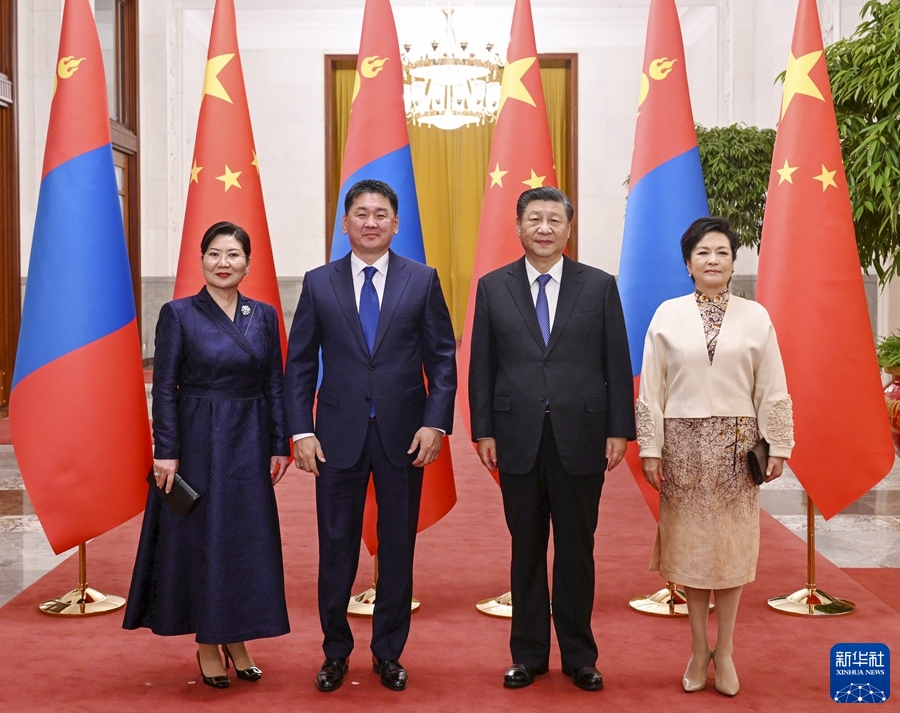
Photo: Xinhua News Agency
Chinese President Xi Jinping on Monday noted the high level of bilateral ties during his meeting with visiting Mongolian President Ukhnaagiin Khurelsukh, and said China stands ready to work with Mongolia to advance the bilateral comprehensive strategic partnership, which benefits the two peoples amid rising world instability and uncertainty.
The two leaders met in September in Samarkhan on the sidelines of the Shanghai Cooperation Organization (SCO) leaders' summit.
The friendly high-level interactions between China and Mongolia underscored the great importance China attaches to neighborly diplomacy and China's commitment to joint development and prosperity in the region, analysts said, holding the belief that the high-level mutual political trust between the two neighbors will further consolidate the foundation for cooperation and tap into more opportunities in diverse fields.
During the meeting, Xi expounded on the 20th National Congress of the Communist Party of China (CPC) and the five features of the Chinese modernization. He pointed out that as the CPC leads the Chinese people of all ethnic groups to advance national rejuvenation on all fronts through a Chinese path to modernization, China will not only realize its own prosperity but also contribute to its neighborhood and beyond through its own development.
China and Mongolia could forge ahead together on the path of national rejuvenation and modernization, and set an example of pursuing integrated development and shared future. Through joint efforts, the two countries could promote the building of a new type of international relations and a community with a shared future for mankind, Xi said.
For his part, Khurelsukh reiterated his adherence to the one-China principle and vowed support for the China-proposed Global Development Initiative and Global Security Initiative. As the international and regional situation is going through profound and complex changes, it is important that the two sides carry forward Asian values and jointly uphold peace, stability and development in Asia, he said.
At the end of the talks, the two presidents witnessed the signing of bilateral cooperation documents covering economy, trade, investment, customs and desertification mitigation.
Before the meeting with Xi, Khurelsukh met respectively with Premier Li Keqiang and Li Zhanshu, chairman of the Standing Committee of the National People's Congress.
Wang Yiwei, director of the Institute of International Affairs at Renmin University of China, said this kind of arrangement demonstrated the great importance China attaches to Mongolia, as a stable environment is the premise of China's development and prosperity.
Against the backdrop of a disrupted global supply chain, the two countries' complementary economies can help each other to overcome current challenges, the expert said.
In a joint statement on pushing forward the bilateral comprehensive strategic partnership in the new era, the two sides reiterated China and Mongolia will respect each other's development paths, and support each other's core interests.
The two sides agreed to continue to convert friendly political relations into an impetus of cooperation, bridge the development initiatives of the two countries and expand cooperation on trade, investment, finance, minerals and energy, infrastructure, digital economy and green development.
Li Yongquan, director of Eurasian Social Development Research at the Development Research Center of the State Council, told the Global Times that China and Mongolia share ideas and interests in regional affairs and global governance, and can cooperate on related topics in multilateral frameworks, such as the SCO, in which Mongolia is an observer state.
Da Zhigang, director of the Institute of Northeast Asian Studies at Heilongjiang Provincial Academy of Social Sciences, told the Global Times that high-level political trust is the basis on which China-Mongolia cooperation can be initiated and operate smoothly.
Da also noted that in pragmatic terms, the two countries have great prospects for cooperation in logistics, infrastructure, energy, agriculture and environmental protection.
Analysts agreed that China's market, capital and technology are highly complementary to Mongolia's resource advantages and the two countries also have great potential to enhance cooperation under the framework of the China-proposed Belt and Road Initiative (BRI).
China has been Mongolia's top investment source and trade partner for 18 consecutive years. Data from Chinese customs showed that from January to October, bilateral trade reached $9.67 billion, a year-on-year increase of 22.7 percent.
The joint statement set the goal of raising the bilateral annual trade volume to $20 billion at an early date and expand trade in coal, iron ore and agricultural products.
Da said that there are great prospects for cooperation in the fields of logistics, infrastructure, energy, agriculture and environmental protection.
Da singled out the China-Mongolia-Russia railway among the current transportation projects, as Mongolia, with improved transportation connections with China, will also become better integrated into the regional trade network and have better links with other Asian markets.
The joint statement also underlined the role of the China-Mongolia-Russia Economic Corridor and vowed to accelerate feasibility studies on upgrading the railway link and the construction of the China-Russia gas pipeline, which passes through Mongolia.
China and Mongolia also decided to deepen exchanges on education, technology and tourism, increase direct flights according to the epidemic situation, and conduct cooperation on disaster reduction and desertification control.
Such large-scale projects will not only facilitate economic development, but also reinforce regional security and stability, Da said.
China has stated clearly on multiple occasions, including in a key Party congress that concluded in October and during President Xi's latest tour to multilateral events in Southeast Asia, that China will uphold the path of peaceful development and will fulfill pledges for joint prosperity through its own modernization, experts said.




